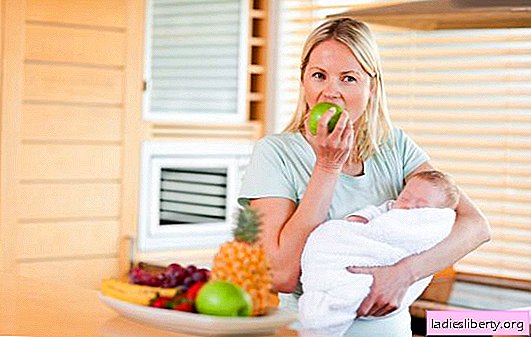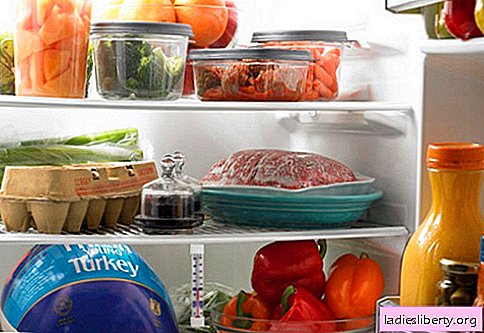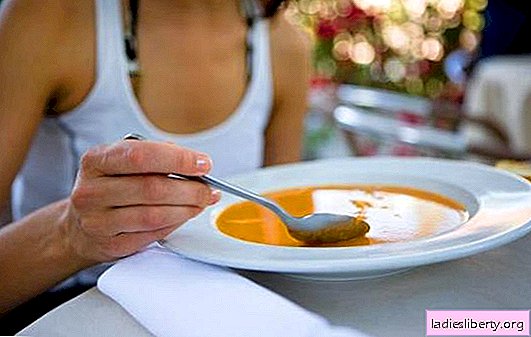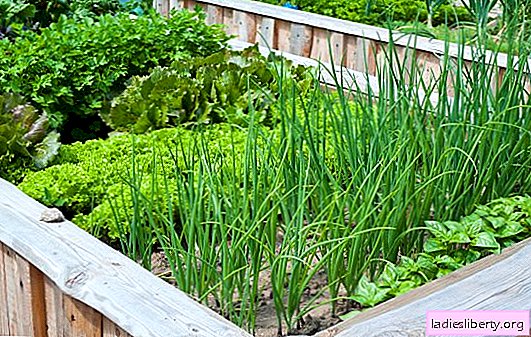
The body of a woman after childbirth requires special attention.
First of all, it concerns nutrition.
There are several reasons for this, but the most important is related to breastfeeding. H
What can and should not be eaten in the first days and months after childbirth?
Mom's nutrition in the first days after childbirth
During pregnancy, the body of a woman and her baby are closely related. The nutrition of the fetus is due to the beneficial substances entering the woman’s blood. That is why there are a number of nutritional restrictions for pregnant women. They are associated primarily with the prohibition of alcohol, which negatively affects the baby. The same is often associated with caffeine from tea and coffee. Another aspect is excess weight, which is gained with excess nutrition and harms both mom and baby.
And then a woman becomes a mother. A close connection in the form of an umbilical cord breaks. However, a number of restrictions may still exist. What does it depend on? The fact is that the birth and attitude of a woman to breastfeeding can be different.
Option 1: Delivery by Caesarean section
In this case, a lot of restrictions inherent in abdominal surgery are imposed on food in the early days. Usually on the first day only a mild drink is allowed, literally a few spoons. Next, vegetable broth, lactic acid products are added. On the second or third day you can eat some crackers from dried bread. Then, within a month, food comes close to normal - soups, cereals, light meat, vegetables, fruits are introduced. The correct diet is observed - several times a day after 3-4 hours. However, all this is corrected in the case of breastfeeding, which imposes certain restrictions.
Option 2: Natural childbirth and artificial feeding
Some women in labor, even before the baby is born, know that they will not feed him with their milk. For someone, this is due to health problems, doctors prohibit natural feeding. For other moms, it's just their own choice. In any case, after childbirth, women who do not plan to breastfeed return to their usual diet. Excellent if it is correct, balanced, full-fledged.
Option 3: Breastfeeding
If a woman plans to feed her baby herself after a natural birth or cesarean section, there are a number of rules for her in terms of her own nutrition. They concern how not to harm a child whose digestive system passes only the stage of formation. However, in the early days it is necessary to establish the production of milk for feeding. How to combine the solution of these two problems? How to choose the right products that would help lactation and at the same time not harm the baby?
What products can be after childbirth
After childbirth, a woman should eat fully. This means that proteins, fats and carbohydrates, as well as a complete set of vitamins and minerals, must be present in sufficient quantities in food.
Among the products that can be after childbirth:
• Milk - better as a component of cereals, soups, sauces
• Sour-milk products - it is useful for both mother and baby, just make sure that it does not cause fermentation in the intestines
• Vegetables - those that do not contribute to gas formation, that is, it is better to be more careful with cabbage, exclude legumes
• Meat - beef, turkey, rabbit, chicken and other low-fat varieties will enrich food with protein
• Cereals - essential as a source of carbohydrates, coarse fiber to improve the digestion of mother and baby
• Fish - a source of beneficial fatty acids, trace elements
• Fats - cream and vegetable oils should be in moderation in the diet of a nursing mother
• Fruit - within reason, observing the condition of the baby.
Good to know: To establish lactation, it is necessary to consume more fluid in the first days. Herbal teas with milk, condensed milk, which it is advisable to drink in the form of heat one hour to half an hour before feeding, are advised. Nuts are also recommended to improve milk production. However, you need to watch how they affect the child, yet nuts are a rather fatty product.
What foods are not allowed after delivery?
Currently, there are many myths surrounding breastfeeding. Some women, often on the advice of not very knowledgeable friends or older relatives, exclude a lot of healthy foods from their diet. Hearing what products are not possible after childbirth in a particular case, for example, with a sick child, people transfer this to themselves. This trend especially intensified with the spread of the Internet, where you can subtract a lot of "horror stories" about completely innocent foods and dishes.
And now, all meat, fish, vegetables, dairy products, fruits, eggs and so on are sent to the prohibited category.
Of course, someone may have intolerance to milk protein, and another baby reacts with rashes when the mother uses eggs or berries to eat. But these may be individual features. The golden rule on the topic of nutrition of a lactating woman - you can eat everything, but in moderation, and be sure to follow how the baby reacts.
However, there are also definitely prohibited products. And also that it is simply not recommended to eat to avoid the problem.
So, what products can not be after childbirth:
• Alcohol - exactly and in no quantity!
• Products containing caffeine - strong tea, coffee
• Potential allergens: citrus fruits, chocolate, honey, red fruits and vegetables
• Onions, garlic, spicy seasonings - can affect the taste of milk and prevent the baby from feeding.
It’s important to note that if alcohol is completely banned, then the rest of the products can be consumed a little and with caution. A cup of weak coffee with milk once a day will not bring much trouble. However, it is in the first days after the birth that it is better to refuse from it, as well as from the other products of this list. And in the future, gradually try to use them.
Mom's nutrition in the first month after childbirth
The baby is born in the hospital - with the exception of some special cases. There, mother and child spend the first days of their lives. Most often, in the maternity hospital, mothers are provided with normal nutrition. For someone, of course, it may seem tasteless, lean, inexpressive and not rich. However, often this is just a matter of habit. People get used to fried, fatty foods, various not very useful seasonings like mayonnaise in large quantities, an excess of salt and sugar. Therefore, healthy soups, cereals, stews do not like. In fact, it is they who are safe for the baby eating mother’s milk, and useful for the woman herself.
Returning home after the maternity hospital, a woman should adopt many nutrition rules from this institution. In particular, a meal regimen.
The principles of the mother's diet after childbirth:
- breakfast, lunch, dinner and one or two meals between them must be obligatory - lunch, afternoon snack
- reasonable portion size
- time between meals - 3-4 hours
- Prevent both a strong feeling of hunger and excessive satiety.
Important! As during pregnancy, during the period of feeding, in no case should you follow the principle of "eat for two." The baby should receive all the nutrients, proteins, carbohydrates, fats, vitamins, so the usefulness of food is important, and not an increase in its volume.
In the first month, the composition of the food remains basically the same as in the first days. Basis - cereals, dairy products, low-fat meat, also low-fat fish, vegetable fats, moderately - butter and eggs. Alcohol is banned. Greasy, fried can cause digestive problems in the baby. It is better to avoid spicy, pickled, bitter in food.
Young mothers often have questions about various products. In particular, for such:
- Bread - how much? In order not to get better, they usually recommend black, rye bread, but it tends to cause gas formation.
It is necessary to observe the middle ground. Begin to introduce bread with dried white. In moderate amounts - if there is no desire to get much better, you should not eat a few pieces, and even use buns, rolls and loaves for dessert. To introduce black and rye bread little by little, observing the condition of the baby.
- Sweets - it's nice, it's delicious, and a source of carbohydrates. However, there are so many fears ...
And fears are often justified. Firstly, a lot of complex carbohydrates - and this is pure sugar or sweets, pastries - overweight is quickly gaining. Secondly, sweets can cause allergic reactions. Therefore, it is advisable to use sweets in moderation, give preference to marshmallows, pastille.
- Chocolate - a favorite treat of many. Natural chocolate contains beneficial substances and even, they say, promotes lactation ...
Chocolate, if it is a quality product, is dangerous one - allergic reactions. In some babies they can be on cocoa, in others for sweets in general. Therefore, not in the first days, but at least a couple of weeks after giving birth, you can try to eat one piece. If after a couple of days there will not be any manifestations - you can use it. Of course, observing the measure, as in everything.
The main advice to moms - watch your baby, focus on his well-being, and not on some abstract tips. So, sometimes fruits, fresh vegetables are banned, it seems like the baby may have diarrhea from them. However, often the kids suffer, on the contrary, constipation, and fruits, vegetables, prunes, beets in the diet of the mother will help solve the problem. And vice versa, if the baby is often weak, it is better to use fixing foods.
Mom’s nutrition in the first month after birth is, in fact, proper nutrition. It’s great if it becomes habitual for life.











